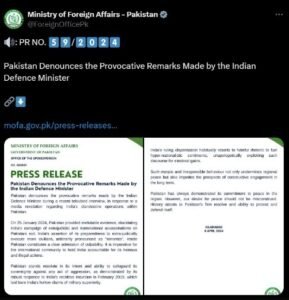On Friday, Rajnath Singh, India’s Defense Minister, made his remarks in response to allegations published by Britain’s Guardian newspaper, which claimed that the Indian government had been involved in the killing of 20 individuals in Pakistan since 2020. The report suggested that these actions were part of a larger strategy aimed at eliminating terrorists residing on foreign soil.
Defense Minister Rajnath Singh stated to CNN News18 that India would pursue individuals fleeing across the border into Pakistan after attempting terrorist acts within India with the intention of neutralizing them.
 India’s fierce response following report
India’s fierce response following report
According to Defence Minister Rajnath Singh, India is prepared to cross into Pakistan to eliminate individuals who flee across the border after attempting terrorist activities within India, as stated in an interview with CNN News18 on Friday.
Singh’s remarks follow the publication of a report by Britain’s Guardian newspaper alleging that the Indian government has been responsible for the deaths of 20 individuals in Pakistan since 2020, as part of a broader strategy to eradicate terrorists residing on foreign soil.
When questioned about the report, Singh asserted, “If they run away to Pakistan, we will enter Pakistan to kill them.” He emphasized India’s desire for amicable relations with its neighboring countries but warned against repeated provocations and attempts to promote terrorist activities within India.
Other issues and justification of statement made
Tensions between India and Pakistan escalated following the 2019 suicide bombing of a Central Reserve Police Force (CRPF) convoy in Jammu and Kashmir’s Pulwama, which was attributed to Pakistan-based terrorists. India responded with an airstrike on a terrorist base in Pakistan.
 While the Pakistani foreign ministry declined to comment on the report, India dismissed it as “false and malicious” propaganda. The report in the Guardian comes amid previous accusations by Canada and the US of India’s involvement in targeting Khalistani terrorists in those countries.
While the Pakistani foreign ministry declined to comment on the report, India dismissed it as “false and malicious” propaganda. The report in the Guardian comes amid previous accusations by Canada and the US of India’s involvement in targeting Khalistani terrorists in those countries.
Canada claimed in September to be pursuing credible allegations linking India to the death of a Sikh separatist leader, which India deemed “absurd and motivated.” Similarly, the US stated in November that it had thwarted an Indian plot to assassinate a Sikh separatist leader, charging an individual alleged to have collaborated with India in orchestrating the attempted murder.
 PM Modi’s take on this
PM Modi’s take on this
When asked about Rajnath Singh’s comments, it was suggested that they align with the stance articulated by Prime Minister Modi, characterized as “yeh naya Bharat hai, ghar me ghus kar marenge” (this is the new India, we will enter their homes and strike).
Prime Minister Narendra Modi has pledged to investigate any information regarding these allegations, with indications of improving bilateral ties between India and Canada.
Pakistan’s rebuttal
Pak denounced this statement to be “proactive”. The statement emphasized Pakistan’s longstanding commitment to regional peace while cautioning against misinterpretation. It highlighted Pakistan’s historical determination and capability to safeguard its interests and sovereignty.
On April 6, Pakistan stated that the Indian government consistently employs divisive language to stoke hyper-nationalistic fervor, unabashedly leveraging such rhetoric for political advantage during elections.
 Pakistan also seized the opportunity to highlight what it termed as “undeniable evidence” illustrating India’s campaign of extrajudicial and cross-border assassinations on Pakistani territory. These assertions were made in response to a recent British media report linking Indian intelligence to the killings of terrorists and extremists within Pakistan, a report Indian officials have vehemently denied, labeling it as “false and fabricated.”
Pakistan also seized the opportunity to highlight what it termed as “undeniable evidence” illustrating India’s campaign of extrajudicial and cross-border assassinations on Pakistani territory. These assertions were made in response to a recent British media report linking Indian intelligence to the killings of terrorists and extremists within Pakistan, a report Indian officials have vehemently denied, labeling it as “false and fabricated.”
Furthermore, the Pakistani statement delved into what could be construed as a realm of fiction, criticizing India’s assertion of its readiness to carry out extrajudicial executions of civilians arbitrarily labeled as “terrorists.” Pakistan viewed this narrative as a deliberate distortion of New Delhi’s position, suggesting that bringing civilians into such discourse reflects malice and underhanded tactics on Pakistan’s part.
Given the circumstances, Pakistan’s statement appears to be a blatant effort to portray itself as a victim in order to garner sympathy, particularly at a time when the nation is grappling with numerous challenges ranging from extremism to economic stagnation.
The feeling of hatred and disrespect towards each other’s nations arises from a long drawn history of violence and wars despite measures being taken time and over again in accordance to dissolve the situation.











Comments 2